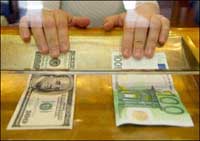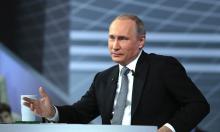Dollar hits record low against euro
The euro and the British pound slipped lower against the U.S. dollar on Thursday as markets awaited interest rate decisions by the European Central and Bank of England.

The euro slipped to US$1.4661 in morning European trading, below the record US$1.4730 it bought the day before and slightly lower than the US$1.4667 it bought in late New York trading Wednesday.
Since the start of the year, the dollar is down 11.1 percent against the euro.
The British pound was down slightly to US$2.1015 from the US$2.1047 it bought in New York, keeping at highs last seen in May 1981. The dollar was up slightly against the Japanese currency, tiptoeing to 112.96 yen from 112.88 yen.
The euro and the pound soared on Wednesday as speculation mounted that China may shift more of its foreign currency stockpiles away from the dollar.
But markets will be paying keen attention to the ECB and Bank of England today as they issue their decisions about benchmark interest rates, said James Hughes, market analyst at CMC Markets in London.
"Any surprises here could easily initiate some relatively big swings for the respective currencies," Hughes said.
Analysts are all but certain that the ECB will keep rates unchanged at 4 percent when it meets, but will be watching closely for signals on its future course. The Bank of England also is expected to leave rates untouched at 5.75 percent.
The dollar has been suffering from speculation that the Federal Reserve, which has cut its benchmark rate twice, may keep doing do even as its European counterparts hold or raise their rates.
Although lower interest rates can jump-start an economy, they can also weaken a currency as investors transfer funds to countries where they can earn higher returns.
A weaker dollar makes vacations overseas more expensive for U.S. travelers and can make foreign companies choose between raising prices and cutting profitability on goods sold in the U.S. But it helps boost U.S. corporations' profits by making their exports more competitive abroad, and makes U.S. vacations more affordable for Europeans.
The euro - introduced on financial markets in 1999 - has risen from a low of 82 U.S. cents in October 2000 mainly because of concerns over the enormous U.S. trade and budget deficits and, now, the subprime crisis. It has also increasingly gained acceptance as a foreign currency reserve in the coffers of companies and governments from China to the Middle East.
Subscribe to Pravda.Ru Telegram channel, Facebook, RSS!




